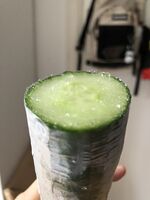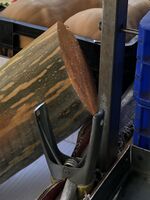SI 18 - Radio Implicancies - Chae's research log: Difference between revisions
(→week 2) |
(→week 2) |
||
| Line 27: | Line 27: | ||
This ‘enabling the possibility of production by others' is often continued beyond the performance not only in the use of FLOSS-style distribution, but also in the conscious use of workshops as a means of presenting works and teaching the skills used in their creation. This pedagogic aspect extends to the prominence given to technical meetings and development workshops in artist-run festivals such as Piksel and MAKEART, or groups such as Dorkbot and OpenLab, and into the creation of dissemination platforms and projects such as pure:dyne and FLOSS Manuals. | This ‘enabling the possibility of production by others' is often continued beyond the performance not only in the use of FLOSS-style distribution, but also in the conscious use of workshops as a means of presenting works and teaching the skills used in their creation. This pedagogic aspect extends to the prominence given to technical meetings and development workshops in artist-run festivals such as Piksel and MAKEART, or groups such as Dorkbot and OpenLab, and into the creation of dissemination platforms and projects such as pure:dyne and FLOSS Manuals. | ||
from pad: https://pad.xpub.nl/p/Problemsofnotation-for_annotation | from pad: https://pad.xpub.nl/p/Problemsofnotation-for_annotation | ||
Hacklabs & Hackmeets | |||
[please make links for this section as we read:] | |||
Hacklabs are voluntarily run spaces providing free public access to computers and the internet. They generally make use of reclaimed and recycled machines running GNU/Linux https://it.wikipedia.org/wiki/GNU and, alongside providing computer access, most hacklabs run workshops in a range of topics from basic computer use and installing GNU/Linux software, to programming, electronics, and independent (or pirate) radio broadcast. The first hacklabs developed in Europe, often coming out of the traditions of squatted social centres and community media labs. In Italy they have been connected with the autonomist social centres, and in Spain, Germany, and the Netherlands with anarchist squatting movements. Hackmeets are temporary gatherings of hackers and activists in which skills, tools and knowledge are exchanged and projects developed. Among the first hackmeets were those in Italy in the 1990s. There are direct connections between many of these and artists working with FLOSS. The dyne:bolic project (from which pure:dyne evolved) partly developed through the Italian hackmeets and Dutch hacklabs. RampArts hacklab in London http://london.openguides.org/wiki/?id=London_Hacklabs_Collective;oldid=London_Hacklab_Collective | |||
has provided a meeting point for the local OpenLab group, and in Barcelona, spaces such as Hackitectura and Riereta have supported several FLOSS-based art and political projects. Not all artists working with FLOSS and livecoding necessarily share the politics of the hacklabs scene, nor do all hacklab participants necessarily look upon their own activities as art-related, and some are, sometimes rightly, sceptical of artistic involvement in what they do. Hacklabs, however, have been absolutely fundamental to the development of FLOSS in recent years, especially in Europe and South America, and have provided a clear political and ethical orientation in contrast to the somewhat confused and often contradictory political and social perspectives articulated in the other communities and contexts of the wider FLOSS world. | |||
If livecoding is one of the most emblematic artistic manifestations of FLOSS, hacklabs have become one of its most emblematic social forms. While the two may not occupy identical trajectories, they nevertheless overlap and compliment one another in many significant ways. Central to this is their shared principle of ‘enabling the possibility of production by others'. This is an issue of distribution, not simply at the level of product, in the way a piece of software can be easily distributed for example, but at the level of practice. The practice itself is inherently distributive, for it integrates the distribution of knowledge on how to produce into that which it produces. While this allows for possibilities of collaborative production, it should be seen as distinct from collaboration in itself. For whereas a practice that is collaborative coheres the production of many under a single goal, thereby directing the disposition of their labour, a practice that is distributive enables the disposition of labour by others under their own direction. This is enabled in the output of production as notation, as code that not only creates a product, but enters into an active life beyond its initial implementation. | |||
===week 3=== | ===week 3=== | ||
Revision as of 11:32, 20 April 2022
Shortcut / Final Project
Classes
week 1
What is Radio Implicacy about?
Radio Implicancies is about practicing interdependencies. About how to stay with the complex entanglements between the personal, the economical, the political and the computational. About thinking, using and making technology with mutual relations in mind.
If everything is mixed up with everything else, where do you start? Does it ever end? What does it mean to mean to say “stop” or “cut”? And how could anything change?
Radio Implicancies invites you to experiment with practical and theoretical propositions by feminist, non-binary, queer, anti-colonial and other disobedient researchers/practitioners (people who do not stay in their own corners) who each in their own way tug at the threads of techno-ecologies. They crack jokes and demand the impossible but also pay attention to feelings of discomfort and despair. From and with them we learn about things like refusal, diffraction (Karen Barad) and figuration (Povinelli, Haraway) and about the openings these might make for imagining technology otherwise.
T. Trying to speak through relations and dependencies, instead of the language of ownership and saying who you are and what you have.
Imagine you are cutting a cucumber, after a while, there are little droplets forming on the cucumber, you take a picture. Now you are walking the streets of Segovia, there is a market. You see a pumpkin cut in half. And again, you see water droplets on the surface. You take a picture. You smile. Now, you are on the street of the Canal in Den Haag, and there are sparkles on the water and you don't take a picture (But I did take a picture haha :P) and really appreciate the moment. I'm here now because I know that these are things that are appreciated here.


Notes: It was very interesting to observe how we choose/use words without thinking. (the word... 'my', 'have', etc) Although it was hard to catch different nuisance of different words. Active listening was 10 times harder than saying it without using the word 'my'.
Well! I got COVID!
Writing practice
With Kimberley, pad: https://pad.xpub.nl/p/writing-and-writing-and-writing
Cabinet
week 2
https://slab.org/2018/02/13/feedforward/
This ‘enabling the possibility of production by others' is often continued beyond the performance not only in the use of FLOSS-style distribution, but also in the conscious use of workshops as a means of presenting works and teaching the skills used in their creation. This pedagogic aspect extends to the prominence given to technical meetings and development workshops in artist-run festivals such as Piksel and MAKEART, or groups such as Dorkbot and OpenLab, and into the creation of dissemination platforms and projects such as pure:dyne and FLOSS Manuals. from pad: https://pad.xpub.nl/p/Problemsofnotation-for_annotation
Hacklabs & Hackmeets [please make links for this section as we read:] Hacklabs are voluntarily run spaces providing free public access to computers and the internet. They generally make use of reclaimed and recycled machines running GNU/Linux https://it.wikipedia.org/wiki/GNU and, alongside providing computer access, most hacklabs run workshops in a range of topics from basic computer use and installing GNU/Linux software, to programming, electronics, and independent (or pirate) radio broadcast. The first hacklabs developed in Europe, often coming out of the traditions of squatted social centres and community media labs. In Italy they have been connected with the autonomist social centres, and in Spain, Germany, and the Netherlands with anarchist squatting movements. Hackmeets are temporary gatherings of hackers and activists in which skills, tools and knowledge are exchanged and projects developed. Among the first hackmeets were those in Italy in the 1990s. There are direct connections between many of these and artists working with FLOSS. The dyne:bolic project (from which pure:dyne evolved) partly developed through the Italian hackmeets and Dutch hacklabs. RampArts hacklab in London http://london.openguides.org/wiki/?id=London_Hacklabs_Collective;oldid=London_Hacklab_Collective has provided a meeting point for the local OpenLab group, and in Barcelona, spaces such as Hackitectura and Riereta have supported several FLOSS-based art and political projects. Not all artists working with FLOSS and livecoding necessarily share the politics of the hacklabs scene, nor do all hacklab participants necessarily look upon their own activities as art-related, and some are, sometimes rightly, sceptical of artistic involvement in what they do. Hacklabs, however, have been absolutely fundamental to the development of FLOSS in recent years, especially in Europe and South America, and have provided a clear political and ethical orientation in contrast to the somewhat confused and often contradictory political and social perspectives articulated in the other communities and contexts of the wider FLOSS world.
If livecoding is one of the most emblematic artistic manifestations of FLOSS, hacklabs have become one of its most emblematic social forms. While the two may not occupy identical trajectories, they nevertheless overlap and compliment one another in many significant ways. Central to this is their shared principle of ‘enabling the possibility of production by others'. This is an issue of distribution, not simply at the level of product, in the way a piece of software can be easily distributed for example, but at the level of practice. The practice itself is inherently distributive, for it integrates the distribution of knowledge on how to produce into that which it produces. While this allows for possibilities of collaborative production, it should be seen as distinct from collaboration in itself. For whereas a practice that is collaborative coheres the production of many under a single goal, thereby directing the disposition of their labour, a practice that is distributive enables the disposition of labour by others under their own direction. This is enabled in the output of production as notation, as code that not only creates a product, but enters into an active life beyond its initial implementation.
week 3
week 4
week 5
week 6
Meetings
to be continued...
Station Skills
Ceramic Station
More! More!
Build your own tempeh incubator
Physical to Digital: A 3d-scanning Experience
Mon 16 May 2022, 18:00-20:00
Feltloom Instruction
Fri 22 Apr 2022, 10:30-12:00
KNITTING MACHINE BASICS
Thu 28 Apr 2022, 13:00-15:00

